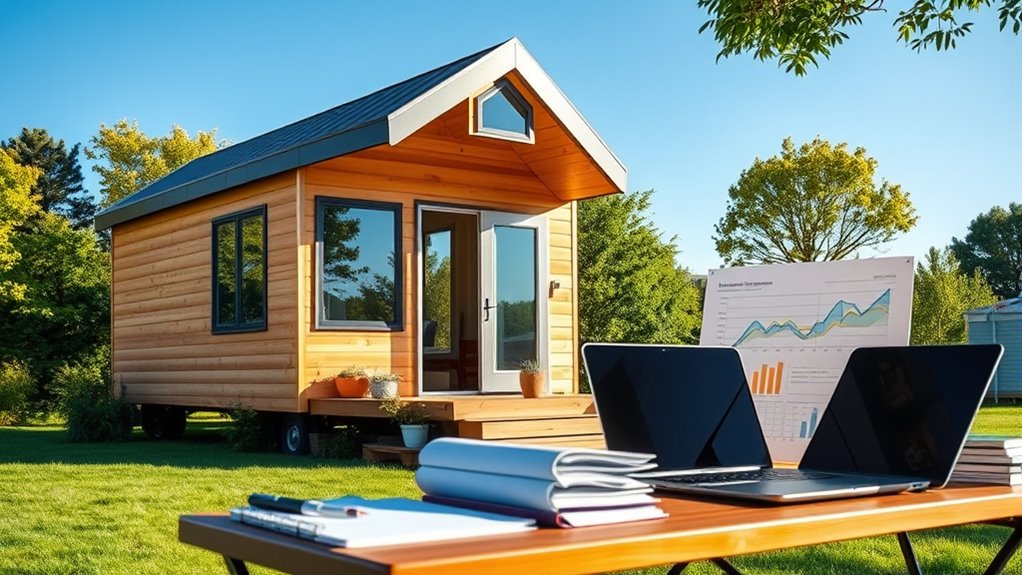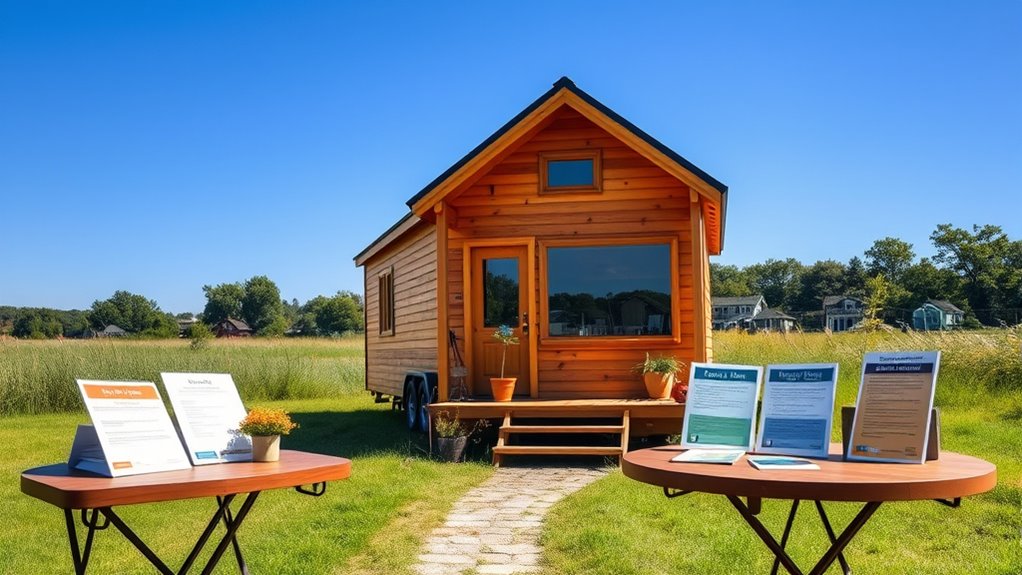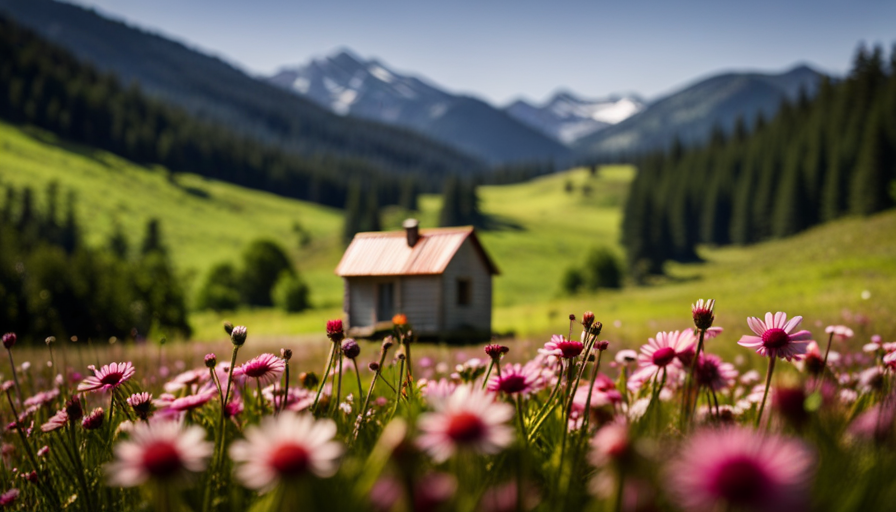To find the right legal and financial resources for your tiny house, start by researching local zoning laws and building regulations, since these vary widely. Look into specialized or alternative financing options like personal loans, peer-to-peer platforms, or home equity loans if you own land. It’s also helpful to consult real estate agents, mortgage brokers, and legal experts who understand tiny house rules. Continue exploring these topics to discover the best ways to make your tiny house dreams a reality.
Key Takeaways
- Research local zoning laws and building codes to ensure compliance and avoid legal issues.
- Explore specialized financing options like tiny house loans, personal loans, or owner financing.
- Consult with real estate agents and legal experts familiar with tiny house regulations.
- Compare insurance providers offering tiny house coverage to find affordable and suitable policies.
- Account for additional costs such as permits, land, and maintenance when planning your budget.

Are you considering building or living in a tiny house but unsure about the legal and financial hurdles? Steering the world of tiny houses can seem overwhelming at first, especially when it comes to understanding zoning laws and securing financing options. Many areas have specific regulations that determine where you can place a tiny home, and these laws can vary widely from one jurisdiction to another. Before you start building or buying, it’s vital to research local zoning laws thoroughly. Some communities may have strict minimum size requirements, setback rules, or restrictions on using tiny houses as permanent dwellings. Others might have designated tiny house zones or allow them only as accessory dwelling units (ADUs). Being aware of these regulations helps you avoid costly legal issues down the line and guarantees your tiny house fits within the community’s rules.
When it comes to financing, many people assume that getting a loan for a tiny house is impossible. While traditional lenders often categorize tiny homes as RVs or recreational vehicles, making financing tricky, options do exist. Some lenders are now offering specialized loans or personal loans tailored for tiny house buyers. You might also consider using a home equity loan if you already own land, or pooling savings and exploring alternative financing like peer-to-peer lending platforms. It’s vital to compare your options carefully and understand the loan terms, interest rates, and repayment plans. Keep in mind that some builders and sellers may offer in-house financing, which could be more flexible but also require careful scrutiny.
Another financial consideration is insurance. Many insurance providers are still catching up with tiny house coverage, so it’s wise to get quotes from multiple providers to find the best fit. Additionally, you’ll need to budget for permits, land costs, and ongoing maintenance, which can impact your overall affordability. Planning ahead and consulting with professionals—such as real estate agents familiar with tiny homes, mortgage brokers, or legal experts—can help you navigate these financial waters more confidently. Also, understanding the size restrictions and local building codes can prevent costly legal issues and ensure your tiny house remains compliant with community standards.
Frequently Asked Questions
Are Tiny Houses Legal in All States?
Tiny houses aren’t legal in all states because zoning challenges and building codes vary widely. You might find some areas where these small homes face restrictions or outright bans, especially on where they can be placed. Check local regulations carefully before building or buying a tiny house, as compliance with zoning laws and building codes is essential. In some places, you may need special permits or modifications to make your tiny house legal.
How Can I Finance a Tiny House?
You can finance your tiny house by exploring personal loans, RV loans, or specialized tiny house construction financing. While it’s tempting to think tiny house communities offer easier options, traditional lenders might be skeptical, so you may need to contemplate alternative funding sources. Think of your tiny home as both a dream and a commitment; securing funds now helps you build a cozy, affordable space in a welcoming tiny house community.
Do Tiny Houses Require Special Permits?
Yes, tiny houses often require special permits, depending on your location. You’ll need to check local building codes and zoning laws to determine if your tiny house qualifies. Some areas have specific regulations for building standards and minimum size. Additionally, property taxes may apply differently for tiny homes, especially if they’re on wheels or stationary. Always consult local authorities to guarantee compliance and avoid legal issues.
Can I Get Insurance for a Tiny House?
Yes, you can get insurance for your tiny house. Tiny house insurance options vary, but many providers offer specialized coverage tailored to your needs. You should explore different insurance coverage options to find policies that protect your tiny home against risks like theft, fire, and natural disasters. Comparing quotes and understanding policy details guarantee you choose the best coverage, giving you peace of mind on your tiny house journey.
What Are Zoning Restrictions for Tiny Homes?
Imagine your tiny home nestled in a community where zoning restrictions shape the landscape. You might need a zoning variance to get approval, especially if your home doesn’t fit traditional building codes. Local regulations often specify minimum lot sizes and setbacks, so check with your city or county to make certain your tiny house complies. Managing these rules helps you avoid surprises and makes your tiny living dream a smooth reality.
Conclusion
Guiding tiny house laws and finances can feel overwhelming, but you’re not alone. Did you know that over 10% of Americans are interested in tiny living? With the right resources, you can confidently tackle legal hurdles and financial planning. Remember, researching local regulations and connecting with tiny house communities can make your journey smoother. Stay informed and proactive—your ideal tiny home lifestyle is within reach, and the right knowledge makes all the difference.









